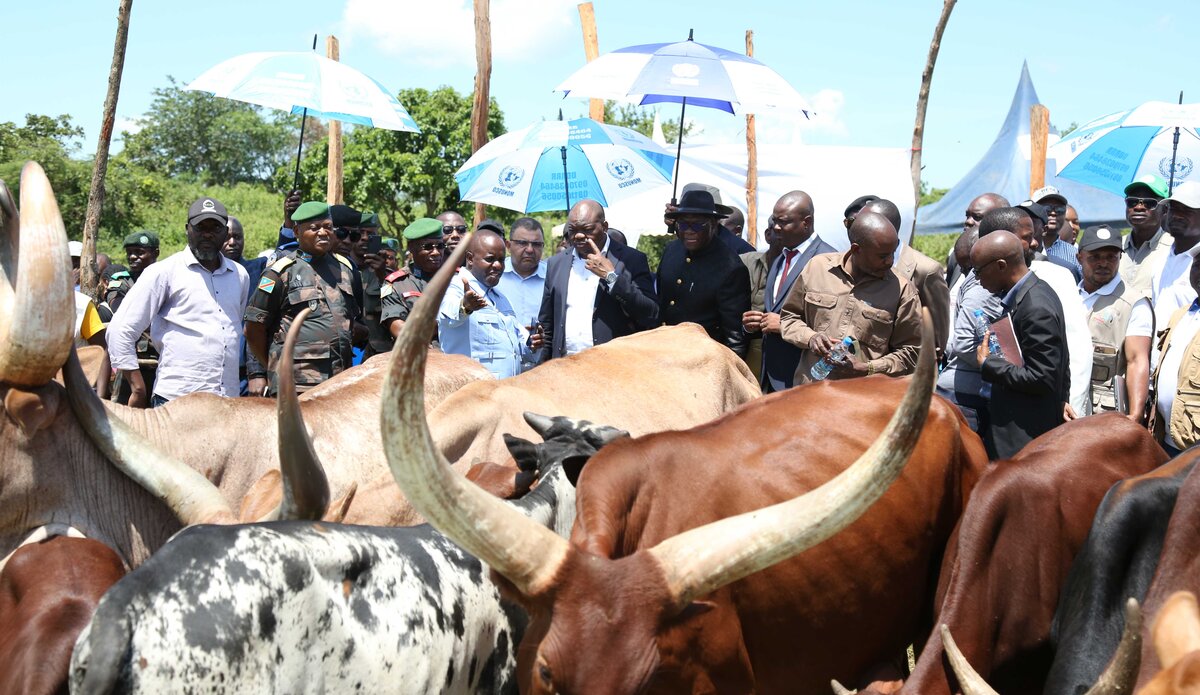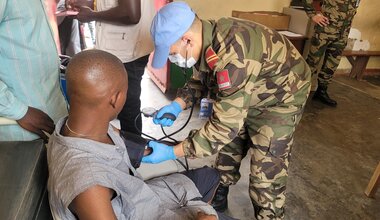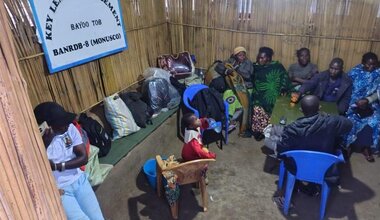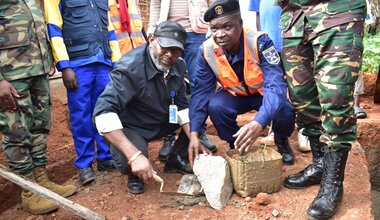Cows, pastures, and family: In Ituri, former militants return to civilian life
Saturday, May 24, 2025. It is a little past 11 a.m., under the scorching sun, in the Tsere community in the Ituri province. Samuel, in his thirties, watches with a discreet smile the lush enclosure where about twenty cows are grazing. This pasture, these animals, this workspace… All of it represents more than just livestock farming: it’s a promise of stability, a symbol of a break from years spent in the bush, marked by violence within the Zaïre armed group.
Samuel is one of sixteen ex-combatants and thirty-two at-risk youths benefiting from a project led by the National Program for Disarmament, Demobilization, Community Recovery, and Stabilization (PDDRC-S), along with MONUSCO, aimed at easing the return to civilian life and social reintegration for individuals who fought in armed groups responsible for serious human rights violations in the province.
Twenty-five cows, and a number of pastures provided for free by the community, tools, technical support for livestock farming, psychosocial support, and training in income-generating activities—all this has been made available to the 48 beneficiaries, enabling them to start a new life and break away from a painful past.
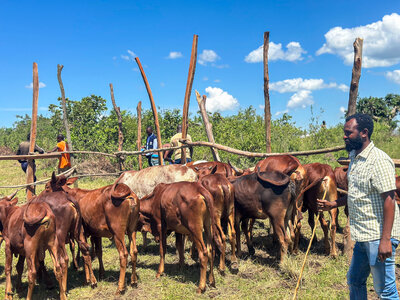
« I wanted to protect my community »
Samuel joined an armed group in 2021. “I joined because my community had been abandoned. I took up arms to defend myself, to protect my people,” he explains, noting that community conflicts in Ituri have fueled a cycle of violence for over two decades.
However, after a few months, Samuel became disillusioned and realized the hellish spiral he had entered. “What I saw there broke me,” he recounts. “Over time, I realized that you don’t build a future through violence.”
Like many other youths, he was drawn in by a simplistic narrative pitting communities against each other, endangering regional security. With limited opportunities, many succumb to the lure of militias that mostly recruit disillusioned, unemployed young people.
Initiating Dialogue and Convincing Militants
From May 26 to June 1, 2023, in Aru, the provincial government of Ituri, with MONUSCO’s technical and financial support, organized a dialogue with the main armed groups operating in the region. Four active groups participated: the Patriotic Resistance Front of Ituri (FRPI), the Patriotic and Integrationist Force of Congo (FPIC), the Cooperative for the Development of Congo (CODECO), and the Self-Defense Movement of Ituri Province (MAPI).
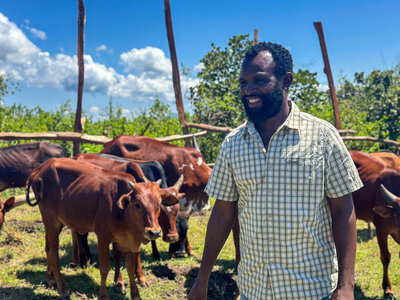
Following the discussions, a memorandum of understanding was signed in which the armed groups committed to ending hostilities and working toward peace, security, and social cohesion in Ituri. Awareness campaigns followed in the weeks afterward to inform and persuade combatants to lay down arms and reintegrate into society.
« Another path is possible »
Samuel was moved by this message and seized the opportunity for a new life, far from the sound of weapons. “I was reached out to by MONUSCO teams during the peace talks in Aru. They spoke to us about reintegration, reconciliation, work, and returning to our families. I listened. I thought. And I understood that another path was possible,” he says.
Now an ex-combatant, Samuel says he personally convinced around ten young people to lay down their arms and explore a different way. “Today, I want to work with my hands, live with my loved ones, raise animals, and contribute to peace. I’m happy to be accepted again by my community,” he shares.
Since the dialogue, over a thousand combatants have surrendered their weapons. For Jean de Dieu Désiré Ntanga Ntita, national coordinator of PDDRC-S, the project is more than material support for vulnerable youth: “It’s a societal choice, a collective decision to turn the page on violence. Peace cannot be built without development, and disarmament cannot succeed without tangible prospects for those who agree to leave the armed struggle.” He also praised the support of local and traditional authorities, without which reintegration would have been far more difficult.
In Tsere, where Samuel lives with his family, the authorities and local population have rallied to welcome the youth. The head of the community, representing the Bahema chiefdom, is pleased with this momentum: “This project was designed with the communities, based on their realities. We are grateful to PDDRC-S and MONUSCO. Above all, we salute the courage of the demobilized youth. To those still in the bush, we say: come back. The community is ready to welcome you.”
“I’ve known war. Now I want to know peace—not just for me, but for my children, my family, my village,” Samuel says again, full of hope.
Supporting the Government
Meanwhile, Khaled Ibrahim, head of MONUSCO’s DDR-S section, addressed the beneficiaries directly—first to commend their courage in choosing peace, and then to reaffirm the United Nations’ commitment to supporting the Congolese government’s peace efforts.
“You are now going to start generating income with your own hands, thanks to your brave act of laying down arms and choosing peace. We will continue to support the government and the PDDRC-S in their efforts to bring peace and stability to the DRC,” he declared during the closing ceremony of the project.
The same message was echoed by Josiah Obat, MONUSCO’s head of office in Bunia: “This initiative embodies MONUSCO’s commitment to supporting the Congolese government in its peace and stabilization efforts. It shows that it is possible to break the cycle of violence by relying on communities, youth, and the collective will to turn the page.”.
 UN
UN United Nations Peacekeeping
United Nations Peacekeeping
